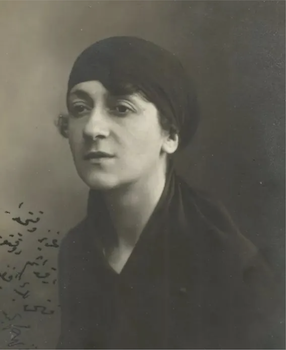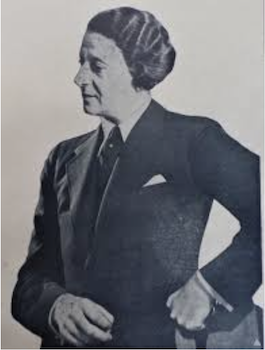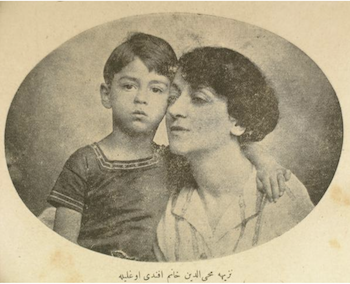Widely known and adorned as a “famous woman writer,” the trailblazing Turkish pioneer in women’s politics, Nezihe Muhiddin Tepedelengil, was born in 1889 in the neighborhood of Kandilli within the greater municipality of Üsküdar in the city of İstanbul, Ottoman Empire (modern-day Türkiye). She was the face of Turkish feminism whose contributions continue to inspire generations. Raised in a family that prized education, Muhiddin’s father, Muhiddin Bey, an Ottoman state prosecutor/Public Attorney, and her mother, Zehra Hanim, was the daughter of the first Head of the General Staff of the Ottoman Empire. They instilled her and her brother, Faik Muhiddin Adam, in a strong sense of intellectual curiosity and an unwavering commitment to social justice and gender equality in all fields of life. Indeed, her family scene consistently encouraged her to strive for more. Despite the constraints imposed by her era, Muhiddin pursued education and advocacy with inexorable determination, allowing her knowledge to manifest itself into activism and ultimately, revolutionary change for the Turkish woman.
Muhiddin initially picked up on the revolutionary ideals of feminism from her mother and her cousin, Nakiye Hanım, who wrote articles for the first Ottoman feminist periodical of Türkiye, Hanımlara Mahsus Gazete (Newspaper Specifically for Ladies). Nakiye Hanım educated and influenced Muhiddin about all sorts of European thought and literature and, from an early age, encouraged her to attend parties and gatherings held by her mother and Nakiye Hanım. At these gatherings, esteemed and illuminated women would discuss the Women’s Rights Movement. Growing up with extensive exposure to the realities of unjust disparity in gender equality instilled Muhiddin with an innate sense of activism and gave her a suitable foundation to later make revolutionary impacts on women’s rights and liberation. Muhiddin strongly believed that women's rights could not be achieved in isolation from other political and economic issues. Not to mention that Women’s suffrage was undeniably essential for complete gender equality in Türkiye; she spent her entire life educating women on their rights within family and society, in hopes of normalizing women's rights to a point where they would simply be inherently imbedded within society’s structuring and would not have to be so desperately sought after.
Muhiddin’s inspiring journey began in the vibrant cultural hub of İstanbul, where she initiated her education at the neighborhood school, Kandilli Elementary School, alongside her brother. However, the schooling system did not meet their parents’ high expectations, and soon, they were transferred into homeschooling. She was exposed to a rigorous curriculum that allowed her to become proficient in multiple languages, including French, German, Arabic, and Persian, alongside their rich literary traditions. She was also very fond of the sciences, passing the national science exam in physics without attending any official classes.
Despite not graduating from the French Christian educational institution the Teacher’s School, formerly Kumkapı Nun’s School, she pursued studies at the American College for Girls in İstanbul. Then, she went on to Darülmuallimat (Female Teachers' School). Muhiddin’s passion for education led her to pursue further studies independently. Specifically, she became a science teacher at the Girls’ High School under the rule of the Committee of Union and Progress (CUP) and later the principal of the CUP Girls’ Technical School, one of İstanbul’s most innovative schools at the time. Muhiddin poured everything she could into the institution and her students as she taught the girls piano, foreign languages, knitting, and other such skills. In fact, during WWI, she transformed the school into a knitting house for the army alongside her students. They were also occupied with nursing wounded soldiers at First Treatment Hospital.
She furthered her educational career by working for the Ministry of Education as an examiner and, later on, ran several other schools, including Gaziosmanpaşa Boys' High School in 1929, which she later retired from. Muhiddin also wrote special reports for the Education Ministry and managed numerous other schools, including foreign ones.
Muhiddin was a highly skilled prolific writer and journalist. She was known as a “strong woman of letters.” Between 1911 and 1944, she published over 300 short stories and completed 17 novels. These works articulated her views on gender roles present in the Ottoman Empire and its society, including the more recently established secular Turkish state with its strong feminist ideals. She was also an editor and writer for the feminist magazine Kadınlar Dunyasi (Women's World), one of the first of its time.
Though there were times when her outspokenness, as part of her contentious character, was perceived to be uncalled for, she responded to being locked up and held in contempt by making fun of herself in the press. She mentioned that she really enjoyed the cartoons depicting herself and laughed out loud at them. The media explicitly demonstrated a significant interest in her charismatic personality, sharp sense of humor, and steadfast dedication to the true value of liberty.
Muhiddin initially got married at 18 to Muhlis Ethem. This marriage was very short-lived, and she rarely discussed the relationship, conveying the impression that it was not satisfactory. She divorced Ethem and, soon after, remarried Memduh Tepedelengil, the commissioner for the İstanbul Municipal Companies. She took the surname of her second husband, though she never used it in her writing, as she preferred “Nezihe Muhiddin.” This was the combination of her maiden name and her father’s name in accordance with traditional Ottoman naming structure. She had one son with her second husband, but unfortunately, this marriage was neither happy nor compatible. Muhiddin’s intense dissatisfaction with marital life is showcased in her novels, which serve as an essential resource for her views on marriage, partnership, and motherhood.
Throughout her career, Muhiddin's most audacious act was shifting her quest for improving women's lives from the classroom to the halls of parliament. For years, she had participated in various non-governmental organizations that sought to improve women’s lives through any small, incremental measures possible. However, given the societal norms of the time, these initiatives unfortunately had very little success at the institutional level. Muhiddin had enough and decided to take matters into her own hands when she founded the first-ever political party in the country (even before its founder, Mustafa Kemal Ataturk): The Women’s People’s Party. The party was aimed at improving women’s economic, social, and political standing; given the times they were living in, this revolutionary discovery did not come, without the male fight for the spotlight and countless sexist oppositions from the male-dominated political establishment. Muhiddin did not let this get in the way of the change she was making, as she remained steadfast in her belief that women deserved the right to full political participation. However, her efforts were met with intense resistance, and the party’s petition for recognition was rejected.

Unabated, Muhiddin was resilient in her efforts and turned the Women’s People’s Party into the Turkish Women’s Union in 1924, along with other feminist suffragists, and persisted in their efforts to empower women with full political rights. The Union was an affiliate of the International Woman Suffrage Alliance (IWSA, now known as the International Alliance of Women). Staying loyal to their initial goal of improving every aspect of Turkish women’s lives, they organized conferences and courses to help women in various career paths. Ultimately, the Union granted Turkish women the right to vote in 1934 (earlier than most European Nations). Muhiddin believed that as women, we “need to assert our rightful places in social and political life. First, we need to raise awareness, then we need to educate.”
Unfortunately, the political establishments of the time became intimidated by Muhiddin's work and threatened her, using numerous strategies to impugn her character and actions. She was accused of embezzling funds from the Union, and the government used these pseudo accusations to shut down and investigate her organization. She was eventually labeled “dangerous,” hindering her presence and projected political success. Her books were subject to very harsh criticism, causing her to almost slip into complete obscurity by the 1950s.
Muhiddin was not jailed but "pardoned" for daring to believe that women should be subject to the same rights as men. Due to these unfortunate events, her name was almost entirely scrubbed from Turkish history books. She passed away in a mental health hospital, La Paix of İstanbul, in 1958 due to a heart attack. Her life’s work has been depicted in a documentary titled Kadin Olmanin Gunahi (The Sin of Being a Woman), which depicts the troubles she and her fellow feminists endured. She has always been severely ostracized throughout the time of her uprising and following her passing. History books have attempted to silence and disregard her very presence; for the most part, they do not even mention her or her allies’ names. Umran Safter-Director of the film announces that the “only sin they committed was that they wanted to be actors in a male-dominated world.”
Muhiddin’s grave was not completed until 2016, and now it proudly stands in İstanbul, Türkiye emblazoned with her last words, “Kadınsız İnkılap Mümkün Değildir” (Revolution without women is impossible) (Muhiddin). During her grave’s completion ceremony, Sema Kendirci-President of the Turkish Women’s Union remarked, “Our unwavering respect towards her guidance and the invaluable lessons we have learned from her will forever illuminate our future paths. May she rest in peace.” Today, her life and work are frequently visited topics for gender studies at various universities such as Özyeğin Üniversitesi, Koç University, Columbia University, Stanford University, University of Chicago, University of Maine, and many more. Her unwavering commitment to gender equality and the Liberation of Women has reverberated through the efforts of women today, and her work continues to inspire new generations.
Why Did I Choose to Research Nezihe Muhiddin?
Growing up as a Turkish-American in the States from a very young age, I was never really exposed to the beautiful history that my country boasts, not to mention the revolutionary feminist ideals and impacts that it possesses. Nezihe Muhiddin’s story was very eye-opening, as it instilled a newfound sense of pride and joy within me. Observing such a strong (not to mention extremely intelligent!) pioneering woman, I became very intrigued by her story and could not stop myself from wanting to uncover more and more about her inspiring journey in the name of uplifting (Turkish) women’s rights and voices. As someone with experience in cultural sexism, her journey was truly a notable one for me. Doing extensive research into her life allowed me to acquire so much gratitude for her and all the women who pushed through predetermined barricades in hopes of liberating feminine status in society.
Works Cited
Arslanbenzer, H. (2018, January 6). Nezihe Muhiddin: A Turkish suffragette. Daily Sabah. https://www.dailysabah.com/portrait/2018/01/06/nezihe-muhiddin-a-turkish-suffragette?gallery_image=undefined#big
Celebrating Women’s History Month: Nezihe Muhiddin (1889-1958), Turkish Feminist, Writer, Journalist, and Activist | Columbia Global Centers. (2023, March 24). Globalcenters.columbia.edu. https://globalcenters.columbia.edu/news/celebrating-womens-history-month-nezihe-muhiddin-1889-1958-turkish-feminist-writer-journalist#:~:text=Muhiddin%20was%20a%20vocal%20advocate
Güler, E. (2014, June 17). Women’s political representation, then and now - Türkiye News. Hürriyet Daily News. https://www.hurriyetdailynews.com/womens-political-representation-then-and-now-67814
Nezihe Muhiddin 1889-1958 Kurucu Genel Başkanımız. (2016, March 16). Www.turkkadinlarbirligi.org. http://www.turkkadinlarbirligi.org/tr/arsiv/270/Nezihe+Muhiddin++1889-1958Kurucu+Genel+Ba%C5%9Fkan%C4%B1m%C4%B1z
Peruccio, K. (2024). Women on the Verge: Emotions, Authoritarianism, and the Novel in Italy and Turkey, 1922-1936. Google.com. https://knowledge.uchicago.edu/record/2596/files/Peruccio_uchicago_0330D_15376.pdf
Tor, S. (2023, March 8). From Nezihe Muhittin to Sabiha Rifat : Five women who helped define modern Turkey. Middle East Eye. https://www.middleeasteye.net/discover/international-women-day-turkey-five-helped-define
Wonderer, M. (n.d.). 82. Nezihe Muhiddin (1889-1958). Tumblr. Retrieved April 1, 2024, from https://www.tumblr.com/midlifewonderer/169466349908/82-nezihe-muhiddin-1889-1958
Zihnioğlu, Y. (2022, November 15). 10 February 1958: Notes on the Women’s Movement and Nezihe Muhiddin. Çatlak Zemin. https://en.catlakzemin.com/10-february-1958-notes-on-the-womens-movement-and-nezihe-muhiddin/
This article was published on 5/18/24


